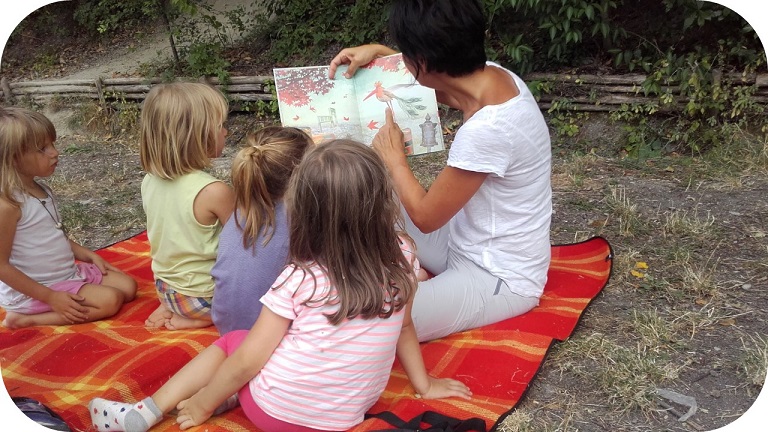Warning! Let's re-naturalize school in pandemic times

DOI
https://doi.org/10.25267/Rev_educ_ambient_sostenibilidad.2020.v2.i1.1501Info
Abstract
This work is born in crisis times, understood as an opportunity to explore new avenues. It is a reflection about the relevance of the relationship between nature and human beings, it is a call for the reconnection with our environment, hence the schools should play a key role. It reflects on the requirement of spending time outdoors during the school day like a straight way towards the reconnection. Nature should be considered as the center of learning-teaching processes, it implies changes in the school organization and the educational practices. This contribution aims to highlight some thoughts and ideas that we think can be inspiring to afford the present and future challenges.
Keywords: Outdoor education, School, Nature, Crisis
Keywords
Downloads
License
Authors who are published in this journal agree to the following terms:
- Authors will retain their copyright and will grant the journal the right of first publication of their work, which will simultaneously be subject to the Creative Commons Acknowledgement License allowing third parties to share the paper as long as its author and its first publication in this journal are indicated.
- Authors may adopt other non-exclusive licensing arrangements for the distribution of the published version of the work (e.g. deposit in an institutional telematic archive) provided that the initial publication in this journal is indicated.
- Authors are allowed and encouraged to disseminate their work via the Internet (e.g. in institutional telematic archives or on their website) once the manuscript has been accepted, which can lead to interesting exchanges and increase citations of the published work. (See The Open Access Effect)
References
Bonil, J., Junyent, M., y Pujol, R. M. (2010). Educación para la sostenibilidad desde la perspectiva de la complejidad. Revista Eureka sobre Enseñanza y Divulgación de Las Ciencias, 7(Número Extrsordinario), 198–215.
Cardeñoso, J. M., Moreno, A., García-González, E., y Jiménez-Fontana, R. (2017). El sesgo de equiprobabilidad como dificultad para comprender la incertidumbre en futuros docentes argentinos. AIEM - Avances de Investigación en Educación Matemática, (11), 145 – 166.
Fjortoft, I. (2001). The Natural Environment as a Playground for Children: The Impact of Outdoor Play Activities in Pre-Primary School Children. Early Childhood Education Journal, 29(2), 111–117. https://doi.org/10.1023/A:1012576913074.
Ford, P. (1986). Outdoor education: Definition and philosophy (Report Nº RC 015 661). Las Cruces, NM: ERIC Clearinghouse on Rural Education and Small Schools. (ERIC Document Reproduction Service No. ED 267 941) http://files.eric.ed.gov/fulltext/ED267941.pdf
García-González, E., y Schenetti, M. (2019). Las escuelas al aire libre como contexto para el aprendizaje de las ciencias en infantil. El caso de la Scuola en el Bosco Villa Ghigi. Revista Eureka sobre Enseñanza y Divulgación de las Ciencias., 16(2), 1–15. https://doi.org/10.25267/Rev_Eureka_ensen_divulg_cienc.2019.v16.i2.2204
Hervás, L. (2015). Aprender en la naturaleza: la experiencia de las escuelas bosque en España. Revista inspira. Recuperado dehttp://www.mapama.gob.es/es/ceneam/articulos-de-opinion/2015-07-08-hervas_tcm7-387348.pdf.
Higgins, P. (1995). Outdoor education provision at Moray House Institute of Education. Scottish Journal of Physical Education, (23), 4–12.
Hueso, K. (2019). Jugar al aire libre. Barcelona: Plataforma Editorial.
Liefländer, A. K., Fröhlich, G., Bogner, F. X., y Schultz, P. W. (2013). Promoting connectedness with nature through environmental education. Environmental Education Research, 19(3), 370–384. https://doi.org/10.1080/13504622.2012.697545.
Marín Ibáñez, R. (1976). Los ideales de la escuela nueva. Revista de Educación, (242), 23–42.
Pozo Andrés, M. (2003). La Escuela Nueva en España: crónica y semblanza de un mito. Historia de La Educación: Revista Interuniversitaria, (22), 317–346.
Rickinson, M., Dillon, J., Teamey, K., Morris, M., Choi, M. Y., Sanders, D., y Benefield, P. (2004). A review of research on outdoor learning. National foundation for educational research and King’s college London. London: National Foundation for Educational Research and King’s College London Research.
Rodríguez-Marín, F., Fernández-Arroyo, J. y García, J. E. (2015). El huerto escolar ecológico como herramienta para la educación en y para el decrecimiento Investigación en la escuela, (86), 35-48.
Schenetti M., y Guerra E. (2018) ‘Emotion Map Making. Discovering Teachers’ Relationships with Nature’, Asia-Pacific Journal of Research in Early Childhood Education, 12(2), 31–56.
Tonucci, F. (2005). La ciudad de los niños. Bracelona: Editorial Graò.
Wells, N. M. (2000). Effects of Greenness on Children’s Cognitive Functioning. Environment and Behavior, 32(6), 775–795. https://doi.org/10.1177/00139160021972793.





